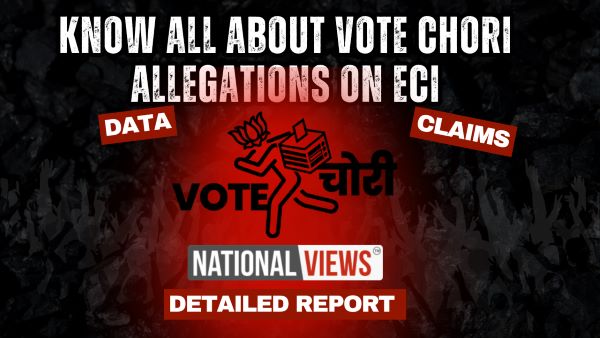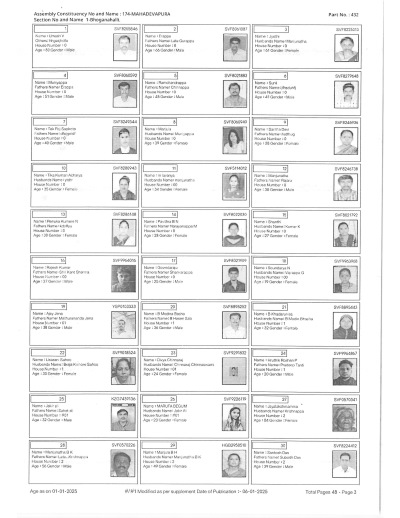India’s democracy, often hailed as the world’s largest, is facing a crisis of confidence. The 2024 Lok Sabha elections and subsequent state elections have been marred by serious allegations of electoral fraud, collectively termed Vote Chori (vote theft) by Leader of Opposition and Congress leader Rahul Gandhi. These claims point to systemic manipulation of voter rolls, particularly in Karnataka’s Bangalore Central constituency. This investigative report by NationalViews gets into the evidence on Vote Chori allegations, the Election Commission of India’s (ECI) response, historical patterns of electoral concerns, and the broader implications for India’s democratic fabric.
The Vote Chori Allegations: A Wake-Up Call
The term Vote Chori gained prominence when Rahul Gandhi alleged large-scale voter fraud in the 2024 Lok Sabha elections, particularly in the Mahadevapura Assembly segment of Bangalore Central. Gandhi claimed that over 100,250 fake voters were instrumental in securing the Bharatiya Janata Party’s (BJP) victory by a narrow margin of 32,707 votes. These allegations were amplified when former Chief Election Commissioner O.P. Rawat urged the ECI to investigate without waiting for a formal complaint.
Speaking to The Telegraph, Rawat emphasized the ECI’s responsibility to act proactively:
“When I was there, our policy was that if any senior functionary of a party raised an allegation, we would suo motu investigate it and present the facts to the common man so that the faith in the system is upheld. We did not ask them to complain to us first.” His call for a probe underscores the gravity of the situation and the need for transparency to restore public trust.
The Bangalore Central Investigation: Uncovering the Evidence on Vote Chori Allegations
The Congress party conducted an exhaustive six-month investigation into the voter rolls of Mahadevapura, analyzing lakhs of paper rolls due to the ECI’s refusal to provide machine-readable digital voter lists. The investigation revealed five types of irregularities, totaling 100,250 fake voters:
Duplicate Voters (11,965 cases):
- Individuals appeared multiple times in voter rolls, some even across different cities like Bangalore, Varanasi, and Lucknow.
- Example: Gurkirat Singh Dang was registered in four different polling booths, with one instance of a voter casting ballots at two separate booths.
Fake Addresses (40,009 cases):
- Voters were registered at non-existent or unverifiable addresses, such as “House Number: 0” or with fictitious relative names like “HHGASJHOFA.” (Check the sample list)
- Example: A commercial brewery, “Biere Club,” was listed as the address for 68 voters, despite being a non-residential property.
Bulk Voters at Single Addresses (10,452 cases):
- Unusually high numbers of voters were registered at single addresses, such as 80 voters in a single-room tenement.
- Congress investigators reported facing attacks when attempting to verify these addresses.
Invalid Photos (4,132 cases):
- Voter IDs contained blurred, missing, or indistinguishable photos, potentially allowing impersonation at polling stations.
- The ECI informally shared photos of a family holding valid voter IDs to counter claims, but this did not address the broader issue of unverifiable photos in the rolls.
Check out the list of files here – Invalid Photos
Misuse of Form 6 (33,692 cases):
- Form 6, intended for first-time voters aged 18–21, was misused to register older individuals, some in their 70s and 90s, as “first-time voters.”
- Example: Shakun Rani, aged 70, was registered twice as a first-time voter within two months and reportedly voted twice.
The Congress presented this evidence through slides during a press conference, alleging that the BJP’s victory in Bangalore Central hinged on these fake voters, as Congress led in seven of the eight Assembly segments in the constituency. The party has made its findings publicly available online, urging citizens to scrutinize the data.
A Broader Pattern of Electoral Concerns
The Mahadevapura findings are part of a larger narrative of electoral irregularities across India. Rahul Gandhi has pointed to similar issues in Maharashtra, Haryana, and Bihar:
Maharashtra Assembly Elections 2024:
Gandhi alleged that 40 lakh voters were added to Maharashtra’s voter rolls in just five months, surpassing the total additions over the previous five years. He also flagged an “unnatural spike” in voter turnout after 5:30 PM, despite no reported queues, suggesting post-poll manipulation.
Haryana State Elections 2024:
Bihar Special Intensive Revision (SIR):
Mass deletions and irregularities in voter rolls during the ECI’s SIR in Bihar have raised fears of a systematic process to manipulate voter lists, potentially extending to other states.
These allegations are compounded by historical concerns about the ECI’s impartiality:
- 2019 Lok Sabha Elections:
- Opposition parties reported discrepancies between voter turnout percentages and final vote counts, but the ECI dismissed these without detailed explanations.
- Gujarat Assembly Elections 2022:
- Prime Minister Narendra Modi’s roadshow on polling day violated the Model Code of Conduct (MCC), yet the ECI took no action.
- West Bengal 2021:
- The ECI’s decision to conduct elections in eight phases was criticized as favoring the BJP’s campaign logistics.
- 2017 Uttar Pradesh & Uttarakhand:
- Complaints of EVM malfunctions and missing CCTV footage in strongrooms were ignored.
- Selective MCC Enforcement:
- Opposition leaders faced swift penalties for minor violations, while BJP leaders’ inflammatory speeches were often overlooked.
Vote Chori Allegations Full PPT by Rahul Gandhi
Vote Chori English Presentation
Vote Chori Hindi Presentation
Vote Chori Kannada Presentation
The ECI’s Response: Deflection or Denial?
The ECI has dismissed Rahul Gandhi’s allegations as “misleading” and “unsubstantiated,” demanding that he file a formal complaint under oath for each alleged bogus voter, citing Rule 20(3)(b) of the Registration of Electors Rules, 1960.
In a post on X, the ECI stated:
“Many such allegations are being made by Shri Rahul Gandhi and are being reported by the media, despite no written complaint ever being submitted by him.”
The Karnataka Chief Electoral Officer also requested documents to support Congress’s memorandum on the issue.
The ECI’s insistence on formal complaints has drawn criticism from former bureaucrats. Former Himachal Pradesh IAS officer Sanjeev Gupta suggested that the ECI could easily verify the allegations by running a query on its voter database: “
@ECISVEEP can simply run a query on your data of 100,250 votes & full electoral rolls based on EPIC, name, age, relation name, age etc. Truth will be out within minutes.”
Former Central Information Commissioner Yashovardhan Azad expressed dismay at the ECI’s response, noting that ruling party members should join Gandhi in demanding answers rather than deflecting with counterarguments.
The ECI’s refusal to release machine-readable voter rolls and its practice of destroying CCTV footage after 45 days have fueled suspicions. On Friday, some users reported temporary difficulties accessing electoral roll download links, prompting allegations of tampering, which the ECI denied. India remains the only major multi-party democracy to restrict voter rolls to hard copies and PDFs, releasing CCTV footage only in response to election petitions filed within 45 days of results.
Voices of Support and a Call for Transparency
Rahul Gandhi’s allegations have garnered support from opposition leaders and civil society. Allies like Shiv Sena (UBT)’s Aaditya Thackeray, CPI’s P. Sandosh Kumar, Rajya Sabha member Kapil Sibal, and CPIML Liberation’s Dipankar Bhattacharya have echoed his call for transparency. Sibal described the ECI as “an agent of the government in power” and Gandhi as a “true patriot.” Bhattacharya demanded that the ECI release full electoral rolls in machine-readable formats to prevent fraud, particularly in light of irregularities in Bihar’s SIR.
The public response has been equally vocal. Protests in Bengaluru on Friday, organized by the Congress, highlighted the issue, while social media platforms buzzed with claims and counterclaims. Independent investigations by media outlets like India Today, The Print, and Deccan Herald have corroborated some of Congress’s findings, turning Vote Chori allegations into a national conversation.
Why the Resistance to Scrutiny?
If the ECI and BJP are confident in the integrity of the 2024 elections, why resist an investigation? The refusal to release digital voter rolls, preserve CCTV footage, or address specific allegations suggests a reluctance to face scrutiny. As Gandhi noted, “They haven’t denied the information. They haven’t said the voter lists are wrong. Instead, they’re saying, ‘Will you do it under oath?’ Why don’t they say the lists are wrong? Because they know the truth.”
Transparency is the bedrock of democracy. By making voter data and election records accessible, the ECI can dispel doubts and restore public confidence. The longer it delays, the more it fuels perceptions of complicity.
Implications for Indian Democracy
The Vote Chori scandal threatens the very essence of India’s democratic process. Key implications include:
- Erosion of Public Trust:
- Persistent allegations of fraud undermine voter confidence, potentially reducing electoral participation and weakening democracy.
- Constitutional Crisis:
- Gandhi has called electoral fraud a “crime against the Constitution,” violating the principle of equal voting rights. A compromised process questions the legitimacy of elected governments.
- Need for Judicial Intervention:
- Opposition leaders and former bureaucrats, including former Bombay High Court Justice BG Kolse Patil, have called for Supreme Court intervention to ensure accountability.
- A People’s Movement:
- The controversy has transcended party lines, with citizens, journalists, and activists joining the demand for transparency. This is no longer just a Congress campaign—it’s a fight for every Indian’s right to a fair vote.
Conclusion: Saving India’s Democracy
The Vote Chori allegations, backed by former CEC O.P. Rawat and supported by detailed evidence, demand urgent action. The ECI must investigate these claims, release machine-readable voter rolls, preserve CCTV footage, and ensure electoral transparency. Democracy is not just about holding elections—it’s about ensuring that every vote counts and that the process is free, fair, and accountable.
The Indian National Congress’s campaign against Vote Chori is a clarion call to protect India’s democratic values. But this is not just a political issue—it’s a matter of national importance. Every citizen has a stake in ensuring that their vote is not stolen. Join the movement to demand accountability from the ECI and safeguard India’s future as a vibrant, democratic nation.
If as a citizen, you want to demand EC accountability, you can fill the form here



